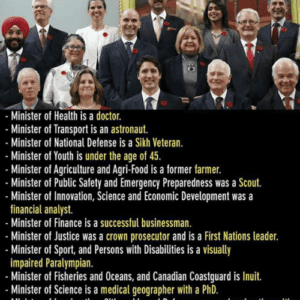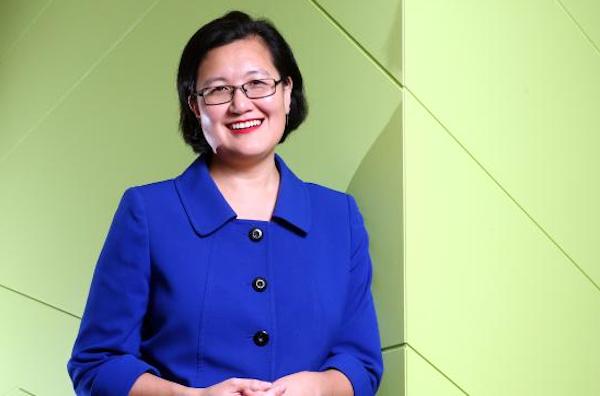We pose this question to our ‘#Auspol Brains Trust’, a group of women who’re active in sharing their opinions on social media, particularly via the #Auspol hashtag.
Melanie McCartney – My focus is humanitarianism. I love people, sharing knowledge and laughs, interested in many topics. Small business owner, budding writer, cook and singer as well as a regular blogger at Melmacpolitics.
The world’s oldest living culture, our Indigenous Australians, only make up 0.4% of Australia’s leadership and executive culture. This is to our disadvantage as a country. It’s a myopic way to run a multicultural country like Australia, the leadership of the country should also reflect the make up of the country. Greater diversity within Australia’s leadership could lead this country to progress like New Zealand has done.
Also if Australia truly wants to embrace our Asian neighbours, Anglo-Saxon centric leadership will not compute with Asian culture. Solution wise, I think a way to approach this is for Anglo-Saxon leaders to be mentored by leaders from different cultures. Once common ground has been found, we can look at leadership quotas that will provide the much needed diversity of thought for the nation.’
Su Dharmapala – Writer. Feminist. Mum.
Attempting to quantify the benefits of an empowered, diverse workforce in all levels of government and business is a little like justifying the need for action for climate change. Even when the empirical science, evidence and actual numbers stack up – feelpinions based on fear and racism get in the way.
Three case studies ought to jolt you out of your privilege, white-hued sleepwalk:
- The Royal Commission into the Banks and Financial Institutions
- Tax cuts for big business
- Wage theft
What does diversity have to do with the RC into the banks? Do me a favour and google the boards of every single major financial institution in this country and tell me how many people of colour you see in those board photos? Women of colour?
I have counted and there is only one – Shemara Wikramanayake from Macquarie.
Clearly having politicians who were once bankers themselves, who all went to same elite schools and who all hang around the same yacht club has worked a treat in protecting you and your hard earned wealth.
Diversity in race, education and gender brings perspective no amount of education, money or well-meaning research projects can buy. Diversity is a lived perspective.
My next favourite initiative by ex-banker politicians is tax cuts for big business. They want us to believe that handing over hard earned tax payer money to business who are already derelict in paying taxes will some how lead to an economic boom. That they will invest in money in their workforce and drive capital investment.
This is a government policy brought to you by a white, male, patriarchal politician who has no idea how removing services to fund that massive ponzi scheme will affect pensioners or school children on the edge.
Do you honestly think a plain speaking black woman coming from hard streets of Redfern sitting in cabinet would have let that one go through the keeper without blood being drawn?
Wages have been stagnating across the board for all Australians while the cost of living has been sky rocketing. Average Australians are struggling under crippling household debt and uncertain economic outcomes because the government has been too busy rewarding their donors instead of setting Australians up for success.
Except for executive pay. Those have gone up
Sure, fine. Fight having a diverse business landscape and government. There is nothing broken here to fix. Australia is in great shape. Everything is tickety-boo! Fight diversity!
Fight it tooth and nail and make sure people with differing perspectives and experiences are shut out from the decision making table and workforce. Let’s not embrace globalised workforce that works across multiple languages and multiple cultures. Let’s insist that Australia is a mono-cultural enclave cut off from Europe which only treats Asia with disdain.
But don’t look to me when Australia becomes – as predicted by the Prime Minister of Singapore in 1985 – the white trash of Asia.
Ming Long (pictured at top) – NED, ASX100 CEO, MD, CFO, Telstra @womens_awards finalist, @100woi, @cewaus, passionate about #leadership#ethics #diversity #climate. Tweets are my own.
Just as we know that greater gender diversity in leadership brings better performance, so does cultural diversity. A McKinsey report in January 2018 shows again that greater gender diversity leads to a 21% outperformance on profitability whilst companies in the top-quartile for ethnic/cultural diversity on executive teams were 33% more likely to have industry-leading profitability. There is greater research around gender diversity, which is right given women make up 50% of our population. Cultural diversity brings another layer of complexity, however, it is the very difference in backgrounds and experiences which is its strength. I would argue that much of the research applicable to gender has an application to cultural diversity. Certain biases may be amplified or muted, but is just as applicable.
I can understand in our culture we are brought up to be competitive which means we use whatever is in our favour to gain an advantage. Caring about diversity means we need to sacrifice our bias so that everyone is better off. We need people to ensure that bias doesn’t blind our ability to see beyond someone’s exterior to their capability and talent. We need to see people of difference as participants who can contribute to society and its progress – that everyone has their place. It is harder, and for people in leadership, it is more demanding to consider difference as a strength – the best leaders can fight against their bias and they naturally lead diverse teams.
We know from the gender research that targets matter. We must start collecting and measuring cultural diversity in our organisations and leadership levels. I have been a proponent of a 40/40/20 target for leadership. As a leader I needed flexibility in a target that was not just 50/50 because if one person left, it was easy to miss the target. 40/40/20 sets a minimum for women at 40%, men at 40% (because they are a gender too), and traditionally 20% could be either gender, except I have asked organisations to consider turning it into a 20% target for other diversity eg. Cultural, indigenous, disability etc. It is also a target that helps with the double bias of the intersection of gender and cultural diversity/other diversity. Our organisations inherently have cultures that measure performance, that is why we need a target to include cultural diversity.
Our world is globalising despite some quarters fighting its progress. In many respects, we are getting closer to each other. I understand that it can be daunting meeting someone who looks completely different and have different cultural practices. Many times I find that there are more elements we have in common than we see as difference. Love, family, security, hope, dreams, belonging are common regardless of ethnicity – elements that make us part of the human race. The issue around cultural diversity normally focuses on needing people of different ethnicities to assimilate into the status quo. Except with any relationship, it needs both sides to reach out to be inclusive of the other. Just as we have Male Champions of Change for gender diversity because they sit in positions of power to make a difference, we need people of Anglo-Saxon background to champion cultural diversity because they sit in positions of power to make a difference. Right now, we just need Anglo Saxon people to just care about the issue.
Denise Shrivell – https://twitter.com/deniseshrivell – is the founder of MediaScope & Peggy’s List as well as a rising political activist. She commentates on the intersection between media & politics.
For the last couple of weeks I was lucky to visit Canada where the Government looks like this.

As you can see their Ministry is made up of people reflecting their Country’s diversity and multiculturalism. This didn’t happen by accident and took recognition of the issue, leadership, organisation and political will.
Watching a bit of news in Canada I came across an interview with their Immigration Minister, Ahmed Hussen, who is himself an immigrant from Somalia. When speaking about Canada’s asylum seeker policy (which is quite opposite to the Australian asylum seeker policy in regard to its humanity & acceptance) he raised their plans to bring in people with medical needs as it reflected ‘Canadian values’. These are the kinds of policies and views which people with empathy and direct experience can bring to Government.
To be honest this interview also made me feel sad for what Australia has become particularly when I reflected on #manus #nauru, the recent raid on an asylum seeker family in regional Queensland – and the media attacks which had already starting against Yassmin Abdel-Magied based on her comments on Anzac Day last year (over 200,000 words were written this year). Then as I landed home Pauline Hanson was going on with her usual anti-immigration dog whistle, all aided by a media all too willing to give her a platform.
In this environment, where politicians and media seem to use and at times attack ethnic background for their own purposes, I wonder if we’re really ready for leaders and spokespeople from a broad range of multicultural backgrounds? You would certainly have to be brave to put your hand up.
For Australia to build greater multiculturalism into both Government & business it will take strong leadership – and political and boardroom will. Sadly at the moment it feels like we’re miles off.
Time for good people to stop walking by…




